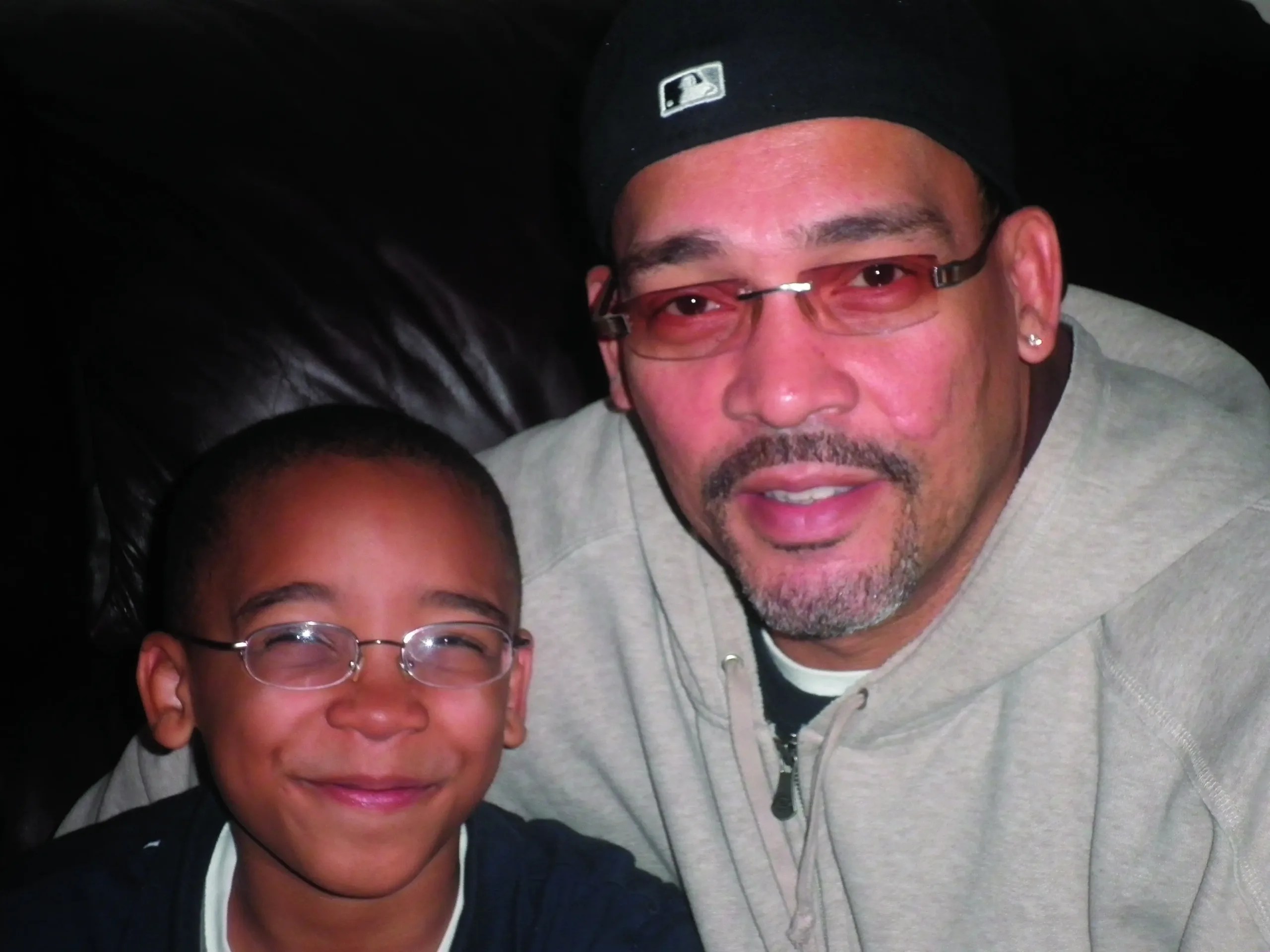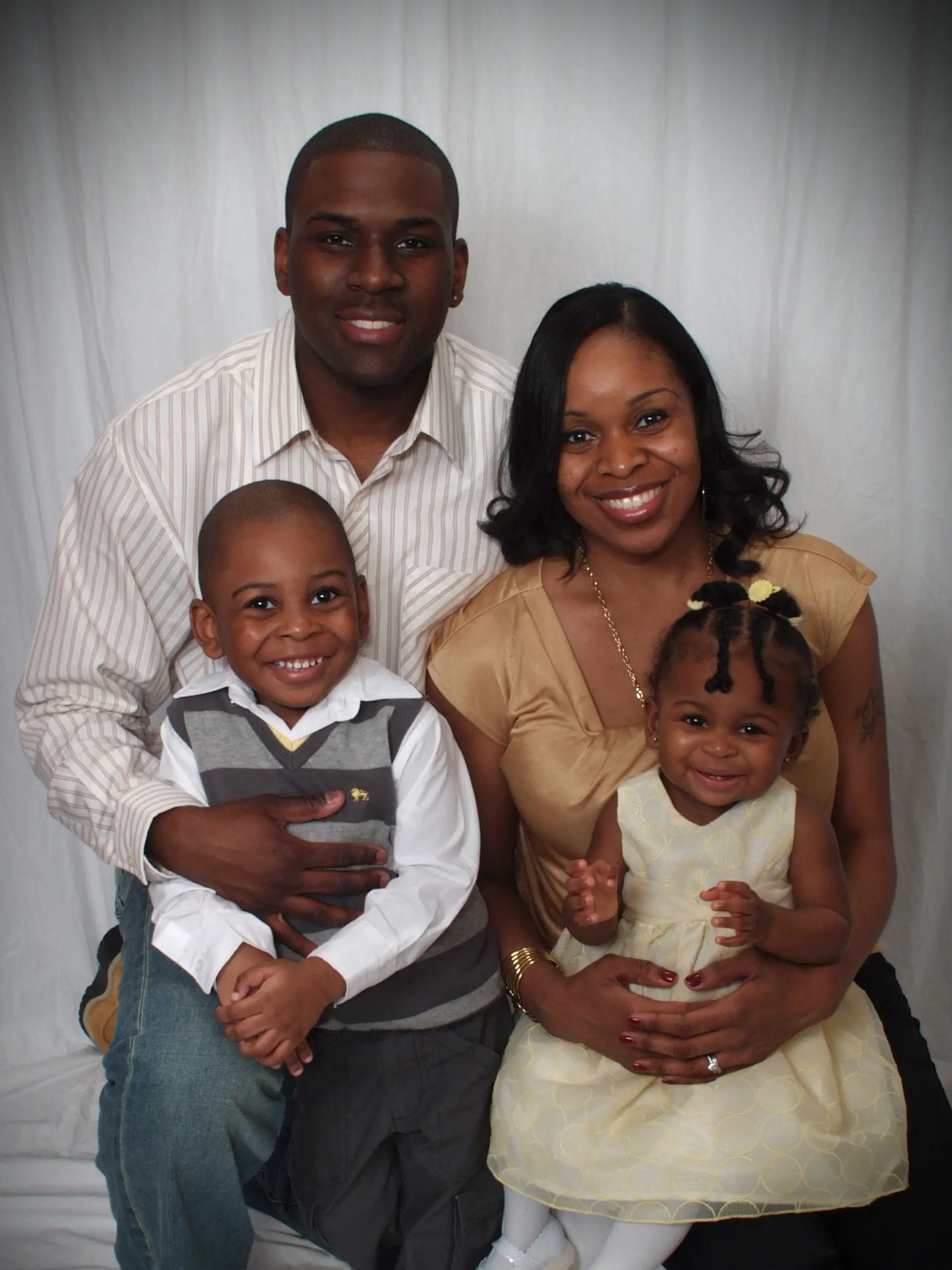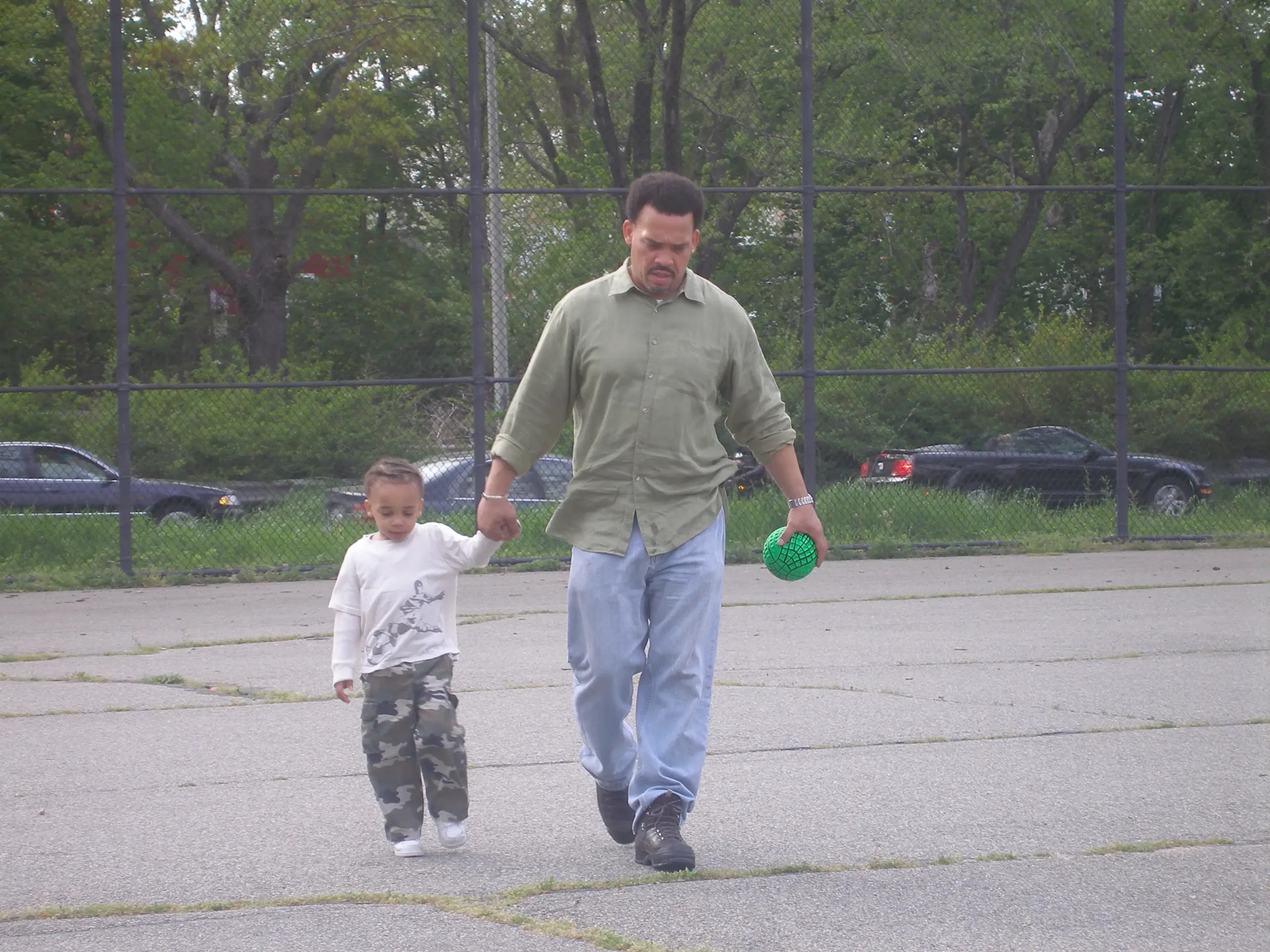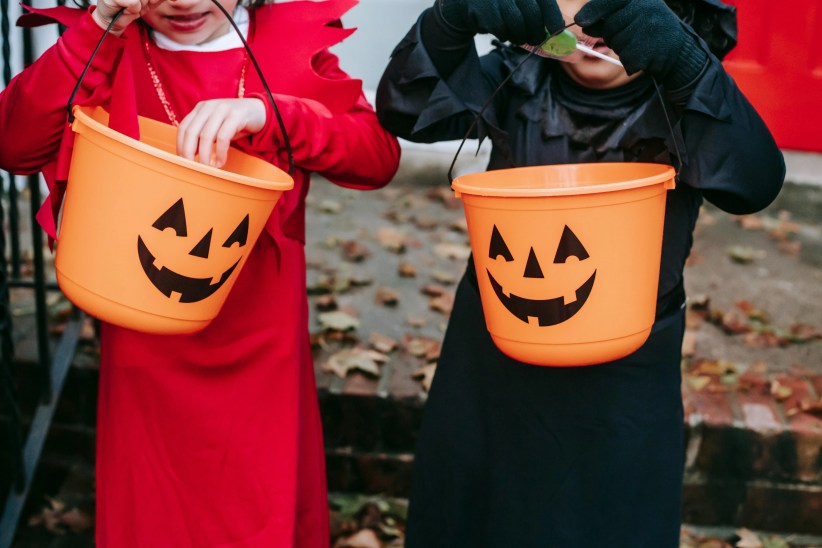When filmmaker Charles Jones’s fifth child and only son, Malik, was diagnosed with autism, he felt ashamed, angry, and alone. He chose to work through his emotions the best way he knew how: by making a film. Autistic Like Me: A Father’s Perspective is a feature documentary film directed by Jones, chronicling the journey of five fathers whose children have all been diagnosed with an autism spectrum disorder. One of those five fathers is Anthony Merkerson, an NYPD cop who lives in Queens with his wife and his two children—a son and a daughter, both of whom have autism.
We sat down in our office with Jones and Merkerson to learn more about their perspective as fathers, but it became clear very quickly that their experiences, and this film, will speak to all parents. Both men spoke honestly about many topics including their initial feelings, how they relate to their children, what they wish other parents knew, the impact the diagnoses had on their marriages, and their deep love for their children.

Interview by Vanessa Friedman
How did you feel when you heard the initial diagnosis of autism for your child?
Charles Jones: I felt alone, but that wasn’t the only emotion. In retrospect the reality is I felt shame. I felt isolated because I wouldn’t share it with anyone in my inner circle. Even my father—it took me a while to talk to him.
Anthony Merkerson: Yeah, this was all new to me. I didn’t know any other fathers or parents dealing with it. You see things on TV about autism, but when it hits home with your own child…first thing was denial:
“My son? No, nothing’s wrong with him, he’s fine.” But deep down I knew something was wrong. It made me feel numb, and I did feel like I was alone.
Once you heard the diagnosis, did you worry about how you would fulfill your desire to teach your child to be a man?
C: Absolutely. I wasn’t informed. I was uneducated, so my imagination just flew. I am actually ashamed to say what I thought autism was, but it was pretty ugly. I had looked forward to raising my son and teaching him everything that I know, to be a better version of me…I wanted my son to be a reflection of me and all my good qualities and none of my bad so, now, how would I be able to do this? I didn’t think my son would ever talk. I didn’t think he would ever tell me he loves me, I didn’t think he would ever communicate with the world, so that was gone.
A: Your thought process changes. You know, I thought, “If I try to instill things I learned from my father, that I want to teach him, will he even understand?” Initially the goal was just making him say a word, a couple of words. You know? Just that alone was the goal, let alone teaching him how to be a man.
And has your child now taught you to be a man in a different way?
C: Absolutely, absolutely. He definitely opened my eyes to what’s important. I’ve never been so focused and driven about anything in my life. I realized that you can’t fight this. There’s no point in feeling sorry for yourself and there’s no point in feeling sorry for him. You have to engage. You have to participate, help, be part of the solution. My wife said, “If you can’t join us, you have to get out the way.” The whole circumstance woke me up as a man. It gave me purpose. I’d like to think that I had some purpose before that, but in comparison, none of that was important.
A: Yeah, before all of this, I think I was living all right…but it was more about me. I went out a lot, I used to always buy clothes and sneakers. But now it’s like I live for the kids. Everything I think about is about them. I’m a police officer, so I work, but my purpose now is just the kids. That’s all I think about, is both of them and my wife—we’re all in it together, so that’s the focus.

Can you talk a little bit about early detection?
C: We caught it with Malik at 2½ but…I feel like we missed [some] time. He’s doing well now, but still, I don’t think understanding is as commonplace as it should be. Just like detecting whether you have the mumps or not, or any other childhood disease, parents should be armed with the knowledge to know the signs about detecting autism. Because the problem with missing it, especially in underserved communities that don’t have knowledge—and I was in that community one time—the problem is, if we don’t find out early now, we’ll pay for it later in society. It’s in our best interest that these children are diagnosed very early. You can’t even begin to do the things that you need to do unless you’re beginning in the beginning. You’re giving that child an opportunity to manage that condition. You give them a better chance at becoming a member of society. There is no catching up. Early intervention, early detection, it’s critical.
Did early detection give you peace of mind?
C: Actually, it was the beginning of a really rough time [for me] because ignorance is bliss. Once we knew, I was angry, I was pissed off, because as I started doing research I was like, “My kid? Are you kidding? No.” That was the beginning of the darkness for me. It didn’t make me feel better at all. It made it worse. I was not easy to be around. It wasn’t pretty. The fears were the worst…and the pain. It turned into anger because it wasn’t being processed in a healthy way. All that anguish came out as anger.
Charles, in the film you say: “For a father, a son is like a mirror in which he sees himself, and I couldn’t wait to watch [my son] grow.” Do you still feel like your son is a mirror in which you see yourself, and, if not, how has that shifted?
C: If you see pictures of him, he’s my twin. So, yeah I see myself. Life has a funny way of changing things for you. Although my son’s condition was a disaster to me initially, over time he has amazed me. I see a lot of me in him. He’s very loving, he’s very sensitive, he cares and he’s affectionate, he’s a big baby, he’s a big teddy bear…and most people don’t know that about me but I’m basically the same. So I do see myself. All the other things that I wanted, it’s not that important, they’re not as important as I thought they were.
A: Besides my son looking similar to me, just personality wise, he’s definitely a clown—I think that’s how I am too. He has a great sense of humor. Even when he was a baby he was always smiling, always laughing.
After we hear that line in the film, there is a comment that upon diagnosis, “it felt like the mirror broke.” That sounds like a different place than you are in now. How did you get from there to where you are today?
C: It’s been a blur, to be quite honest with you. I was gone. I mean, I was there but I wasn’t there. The more I talked about it, the more I started thinking about it, the easier it became. The whole process of making the film was therapeutic, so it has changed for me. I have evolved into acceptance. I handle it differently.
Are the children featured a lot in the film?
C: Honestly, to a lesser degree than some would want. One of the things I told everyone when I first approached them was: I will not exploit your children. We don’t need to show them having meltdowns….We don’t need to exploit people’s pain and make people uncomfortable. But there is a reality here, and we do need to show these children. Because the reality is, these kids, they don’t have to have a meltdown for you to see that there’s something different. Pay attention and you’ll see that there’s something different. But you also see them and life is just as typical as in anybody else’s home. I wanted to show that, and then contrast that with a little bit of the difference.
And how do you feel when you think about your kids potentially seeing this film when they are older?
A: I think it will just be more concrete evidence of showing how much we love them and how much we did for them when they were young kids, so that would be great if they could see how we tried to help them.
C: I’m trying to make something to be proud of and for my family to be proud of, for my children to be proud of. I don’t want to do anything that’s going to hurt anyone intentionally, and that includes my kids. Actually I want my son with me while I’m doing the editing process, you know, I want him hanging out with me, I want him to see this. He has this photographic-memory; he can remember a whole show and script it. He can quote everybody in the trailer! He’ll say, “Daddy, we working on our movie today?” Does he really get it? I don’t think so. The great thing is he still has his innocence. He doesn’t feel ostracized; he doesn’t feel like an outsider anywhere he goes. Everybody loves him. He’s very personable so he doesn’t feel negative about anything. He’s only 7. I hope to God he gets to see this, see what I’ve done, and how he’s inspired me. That’s important. 
Tell me about your relationships with your wives. You often hear that the strain of having a child with autism can ruin a relationship. Do you feel that’s a struggle?
C: First of all, Anthony and his wife inspire me. They’re so positive…I looked for the cracks, but there aren’t any. Personally, my wife and I [are] separated. She and I are still very close and I love her dearly. I own a lot of why we are where we are. My son’s condition had a direct impact on me and my personality and my ways. I didn’t know how to be happy. I wasn’t pleasant. I wasn’t the lively person that my wife had married. She was a rock. If it wasn’t for her, we wouldn’t even be where we are now and Malik wouldn’t be where he is. I was too selfish to realize she needed my help—not even that she needed my help, that we needed to do this together.
A: Initially my wife was more accepting of my son’s diagnosis. I was in denial. [But] once I started seeing him with the therapist, I knew he needed all the help he could get. Since then we were all in it together. Focusing on our kids’ development actually made us even stronger as a couple. We still maintain our own hanging out. We spoke about it one day and said, We’re going to be dealing with this for a long time but we have to have our time too, or we’re going to drive ourselves crazy. That was an agreement we had. We have designated people in our family that can take the kids for a couple of days and we do our own thing. We’re going to the Poconos in a couple of weeks. We go to comedy clubs, we go out to eat, we do what we can. Our formula is to have our time away from the kids so when we get back with the kids we can maintain helping them develop as they get older. Like I said, it definitely brought us closer as a couple. It’s something we both feel passionate about: just hoping, and giving the kids the best so they can succeed.
Do you think mothers of children with autism will find anything particularly surprising from this film?
C: I think that women in general will be surprised that men want to help. I think women will be surprised that men really want to engage…they just don’t know how. A lot of men aren’t in touch with their feelings. They don’t really know how to begin. You have to practice speaking about these things. It’s not easy.
A: I think my wife will be surprised to see me expressing my feelings about the whole situation. When we were going through it I wouldn’t really open up and have a deep conversation with her about how I was feeling. Guys do not really express themselves when it comes to dealing with this. They’re often holding it in, either from shame or anger. There’s a feeling of, let the women handle it, let them deal. Nowadays you mostly see women are advocating about this subject, but you know, men are sensitive too, and they care about their kids. That’s important to know.
What are ways you’ve found successful to connect with your child that might be helpful to other fathers?
C: I think what’s important is for the father, or the father figure, to find a way to engage with the child. Find the common ground. It really depends on where that child is in his or her development. You can’t force them to do things they don’t want to do, it’s going to drive them nuts. You have to find out what works for them. Try to find joy in the things they love to do because the surprise is, you’re going to find joy in it too. Once you see their reaction, your heart’s going to smile. You get to be part of something with them, instead of being on the outside. It requires a lot of patience, and exercising patience takes practice: Bite your lip, your tongue, pinch yourself. They don’t dance to the same beat we dance to. Your disappointment is based on the things that you wanted them to do. Well now, find out what they want to do.
A: Patience is definitely number-one. I thought I had patience, but I had to be super-patient with my kids…. You definitely have to create a bond with your kids. Whatever they like, you have to like…you have to learn to like what they like. My son loves going to the barbershop. I bring him with me all the time. All the barbers know him in there—that’s like an event for him.
What do you think are some important things that people who do not have personal experience with autism or children with special needs should know?
A: Every day is different. You have to just live day by day when it comes to parenting, especially when you have kids with special needs. I’m definitely not an expert but I know a lot more about autism now than I did back then. I know that early detection is very important. Go with your gut. If you notice something different about your child, you have to address it.
C: I’m not an expert on autism. I know a lot more than the average person, but what I’m trying to become is an expert on me. I want to make a difference in my life to make sure that I can contribute to my son’s wellbeing. Being stuck in a dark place does nothing for him, and that’s why I’m working on me. It’s the ripple effect: If I take care of me, he benefits, and my family benefits. I think that’s the message we’re trying to put out for fathers. The primary reason we are doing this project is for dads to find comfort in seeking help and learning how to engage with their children. That’s what I’ve become knowledgeable about. I don’t know why autism happened. I’m not going to figure that out, I’m not dealing with that, I don’t even engage in those debates. I’m dealing with the here and now.
I’ve heard from many parents who have children with special needs that they would not want to “cure” their children. Would you want to change your child’s diagnosis if you could?
A: I think I would. [Crying.] This is very hard to deal with. Would I change their personalities? No—not my son, not my daughter. But my daughter…she’s still not talking fully. I want her to talk to me, to tell us, “I love you mom, I love you dad.” My son has come really far along. Sometimes I forget he’s even a child with autism, but this has been so tough. For example, I’m still going back and forth with the Board of Ed. It’s definitely rough. I love both the kids dearly, but if I could change it? Yes, I would.
C: I kind of contradict myself about this all the time. Would I change my son? Absolutely—but in the same breath, I don’t know if I would change anything about him. My concern for him is his independence. Who he is today, I love this little boy. Everything he is makes him who he is, makes him endearing to me. So changing any of that, I don’t know what that would give me. I’m in love with him, man—that’s my heart. I can’t change that.

And finally, if you could go back in time and say one thing to your past self that your present self knows now, specifically pertaining to your children, what would it be?
A: I’d say: Just open your eyes, notice the obvious. Don’t be so stubborn. Go with your gut.
C: I’d say: Stop it man, you’re wasting time. There’s no catching up. You have to do this now. I’d say, your son needs you.
The film Autistic Like Me: A Father’s Perspective is currently in post-production. Learn more about the film, join our call to action, or attend the pilot outreach forum in NYC on April 25.


















